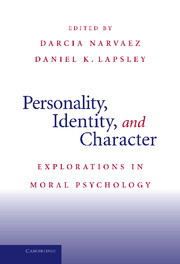Book contents
- Frontmatter
- Contents
- Contributors
- Introduction
- 1 The Moral Personality
- 2 The Moral Functioning of the Person as a Whole: On Moral Psychology and Personality Science
- 3 Moral Science? Still Metaphysical After All These Years
- 4 Cultural Pluralism and Moral Identity
- 5 Neuroscience and Morality: Moral Judgments, Sentiments, and Values
- 6 Triune Ethics Theory and Moral Personality
- 7 Early Foundations: Conscience and the Development of Moral Character
- 8 The Development of the Moral Personality
- 9 Urban Neighborhoods as Contexts for Moral Identity Development
- 10 Moral Personality Exemplified
- 11 Greatest of the Virtues? Gratitude and the Grateful Personality
- 12 The Elusive Altruist: The Psychological Study of the Altruistic Personality
- 13 Growing Toward Care: A Narrative Approach to Prosocial Moral Identity and Generativity of Personality in Emerging Adulthood
- 14 Moral Identity, Integrity, and Personal Responsibility
- 15 The Dynamic Moral Self: A Social Psychological Perspective
- 16 The Double-Edged Sword of a Moral State of Mind
- 17 Moral Identity in Business Situations: A Social-Cognitive Framework for Understanding Moral Functioning
- 18 The Moral Functioning of Mature Adults and the Possibility of Fair Moral Reasoning
- 19 Moral Personality: Themes, Questions, Futures
- Author Index
- Subject Index
14 - Moral Identity, Integrity, and Personal Responsibility
Published online by Cambridge University Press: 05 June 2012
- Frontmatter
- Contents
- Contributors
- Introduction
- 1 The Moral Personality
- 2 The Moral Functioning of the Person as a Whole: On Moral Psychology and Personality Science
- 3 Moral Science? Still Metaphysical After All These Years
- 4 Cultural Pluralism and Moral Identity
- 5 Neuroscience and Morality: Moral Judgments, Sentiments, and Values
- 6 Triune Ethics Theory and Moral Personality
- 7 Early Foundations: Conscience and the Development of Moral Character
- 8 The Development of the Moral Personality
- 9 Urban Neighborhoods as Contexts for Moral Identity Development
- 10 Moral Personality Exemplified
- 11 Greatest of the Virtues? Gratitude and the Grateful Personality
- 12 The Elusive Altruist: The Psychological Study of the Altruistic Personality
- 13 Growing Toward Care: A Narrative Approach to Prosocial Moral Identity and Generativity of Personality in Emerging Adulthood
- 14 Moral Identity, Integrity, and Personal Responsibility
- 15 The Dynamic Moral Self: A Social Psychological Perspective
- 16 The Double-Edged Sword of a Moral State of Mind
- 17 Moral Identity in Business Situations: A Social-Cognitive Framework for Understanding Moral Functioning
- 18 The Moral Functioning of Mature Adults and the Possibility of Fair Moral Reasoning
- 19 Moral Personality: Themes, Questions, Futures
- Author Index
- Subject Index
Summary
Most people think of themselves as being principled. College students regard themselves as more principled than the typical person and believe they behave consistently with their principles most of the time (Miller & Schlenker, 2009). Yet data document an increasingly prevalent “culture of cheating” and breakdown of traditional ethical behavior (Callahan, 2004), with dramatic increases in cheating over the last 30 years in the United States (Kleiner & Lord, 1999; McCabe, Treviño, & Butterfield, 2001). In one recent study, 75% of college students admitted to cheating on exams and papers, 70% admitted to stealing, and 89% said they broke promises (Schlenker, 2008). Principled conduct is admirable in the abstract, but the temptations and pressures of daily life often encourage expediency.
It is the thesis of this chapter that personal commitment to a principled ethical ideology, as opposed to a more expedient ideology, determines the strength of the relationship between moral beliefs and behavior. Personal commitment links the self-system to moral principles, producing a sense of obligation to perform consistently with those principles, a sense of responsibility for relevant conduct, and an unwillingness to condone and rationalize ethical failures and transgressions. With high personal commitment, a principled ethical ideology becomes a dominant schema for interpreting events and for guiding conduct. As such, the strength of commitment to a principled ideology has implications for a wide range of social activities. The remainder of this chapter will elaborate these ideas.
- Type
- Chapter
- Information
- Personality, Identity, and CharacterExplorations in Moral Psychology, pp. 316 - 340Publisher: Cambridge University PressPrint publication year: 2009
- 21
- Cited by



